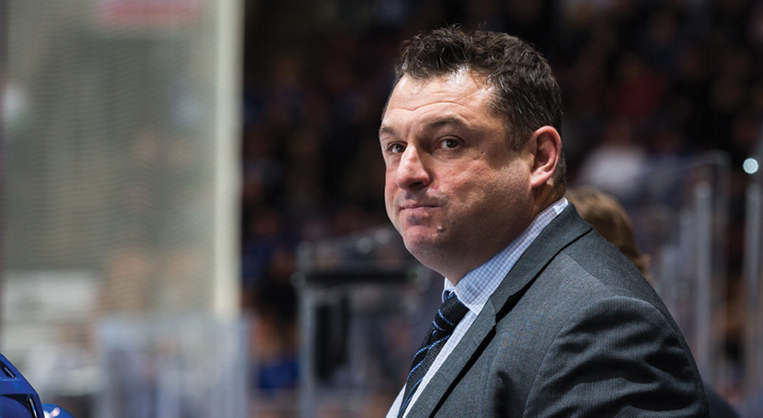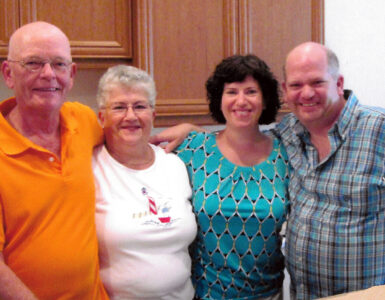The NHL Coaches of Essex County
Story by Michael Seguin
When it comes to talent, Windsor is a startlingly diverse community. Artists. Athletes. Entertainers. Entrepreneurs. The breadth of Essex County’s ingenuity is dizzying.
However, if there’s one caliber of person Windsor-Essex seems to excel at creating, it’s hockey coaches.
Windsor is home to a great number of professional players-turned-coaches. The list includes, but is certainly not limited to: Steve Ott, Assistant Coach of the St. Louis Blues, Bob Boughner, Assistant Coach of the San Jose Sharks, Joel Quenneville, Head Coach of the Florida Panthers, D.J. Smith, the Head Coach of the Ottawa Senators and Bobby Jones, Assistant Coach of the same team.
It’s difficult to find five bigger industry giants. Each one distinguished themselves as players for a variety of teams, such as the Detroit Red Wings, the Florida Panthers, the Toronto Maple Leafs, the New York Islanders and many, many more. Most remarkably, each has successfully made the transition from professional hockey player to the professional coaching community.
And for many of them, hockey is about community.
“My Mom and Dad were both 25-year Canadian Air Force,” Ott recalls. “We moved all over the place. Hockey was common ground with people. Because then you know where you fit in right away. It helps with making friends growing up. It’s an easy way to communicate [with others] and find friends at a young age when you’re moving every couple years. It really helped, having those roots through hockey.”
A common connection these local legends have is the Windsor Spitfires. Bob Boughner himself purchased the team in 2006, during the NHL’s lockout year.

“2006 was the lockout year,” Boughner states. “During the time off that I had, I always came back to Windsor. And I watched a ton of Spitfire games. I’ve been watching them since I was a kid. I was always a fan of the Spitfires. I heard the team might be for sale. So with Warren Rychel and Peter Dobrich, we inquired. That was the year I hurt my knee, so I thought what better way to stay in the game than by buying the Spitfires, becoming a coach and learning on the job?”
The Spitfires soared under Boughner’s leadership. Over time, others were brought in, including D.J. Smith and Bobby Jones.
“I worked with Bougie, D.J. and Rychel—who was our general manager,” Jones recalls. “I spent nine seasons here. We saw great success.”
In May 2009, Boughner led the Spitfires to their first Memorial Cup in 21 years. Boughner’s team defended their championship again the following year.

In addition, Joel Quenneville even played with the team the first year their skates hit the ice, back in 1971.
“Playing with the Spitfires the first year they got a team was a privilege,” Quenneville states. “It’s great to see the Spits doing so well. I’m happy for that crew, seeing all their success. They’re still doing well today.”
When asked about making the leap from the ice to the bench, many agree that the transition was difficult, but necessary. Especially considering the physical toll pro hockey takes on the human body.
“It was a calculated decision on my part,” Ott states. “I could have still played hockey. I still had a contract offer to play in Montreal so I could have pushed forward, but I chose to retire and take on a coaching job with the Saint Louis Blues. I had 15 surgeries in 15 years. To say that I was pretty beat up is an understatement.”
“It’s a very, very demanding sport,” Boughner states. “I’ve broken my nose 6-7 times. I’ve had two shoulder surgeries, a knee surgery. I’ve broken wrists. Multiple injuries. To this day my knees are pretty arthritic. That’s essentially why I retired when I was 35. I think I could have played another year or two but my knee just wouldn’t allow it.”
For some, the transition was a natural one.

“Getting into coaching was pretty seamless for me in terms of what worked and what didn’t work, system-wise,” Jones says. “It’s easier your first couple of years because you’re fresh out of the game. You’re inexperienced as a coach behind the bench, but you’re really experienced as a player. You have to stand behind the bench and coach for a number of years before can get good coaching experience.”
“The one thing you want to do when you’re putting everything together is create a team identity,” Quenneville explains. “We want to be a hardworking team. We want to play fast. We want to possess the puck and do everything we can to keep it. On top of that, a lot of things positive can happen.” “It’s very rewarding!” Ott exclaims. “It is so satisfying to see your team maximize who they are as players. You see them gain confidence after you have a private meeting with them. Seeing it all come together—it’s amazing.”
Steve Ott won his first Stanley Cup against the Boston Bruins this past June.
“Winning the Stanley Cup… there really are no words for it because it was that amazing,” Ott admits. “That emotion, that lifelong dream of having a chance to win and play for the trophy. The whole trip, the whole ride was outstanding. It still doesn’t feel real. It took me 20 years to get it, hopefully I’ll be able to do it again!”

And, as many will attest to, growing up in Windsor helped prepare them for their careers on the ice.
“Windsor is a blue collar town full of people that work extremely hard,” Ott states. “Those things are a staple of your life. I’ve taken that blue collar work ethic into my own life, and it helped to make me the coach that I am. I don’t take anything for granted in our town or community. I think a staple of who you are is where you come from.”
“There’s so many professional hockey players and coaches in the area,” Jones explains. “It’s like no other area that I’ve lived. You can have a barbeque and invite Bob Boughner, D.J. Smith, Steve Ott, Mike Weber and Warren Rychel—all these guys that played in the NHL! We have a great group of guys here. We’re all good friends. We hang out together. Our kids hang out together. It’s a fun spot for us!” Sticks will hit the ice on October 2, 2019, for the next NHL hockey season.








Add comment